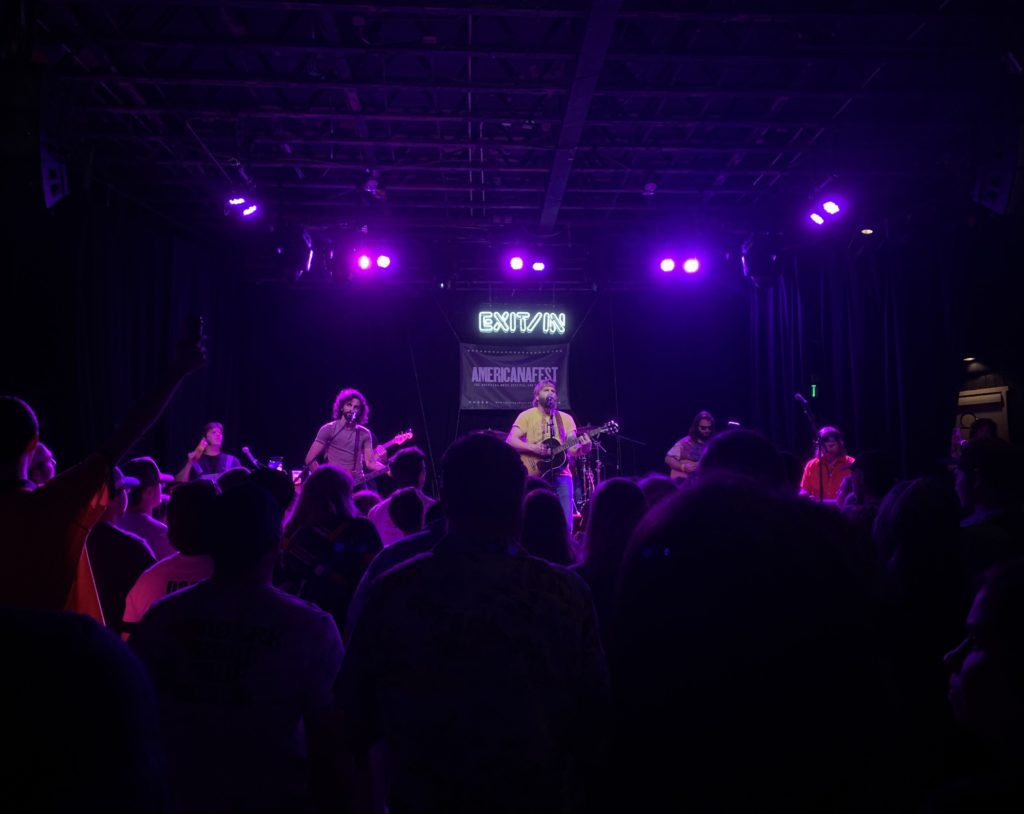
A mainstay in Nashville’s independent music scene is on its way out. Exit/In is just the latest casualty of Music City’s hot real estate market.
“Everyone’s got an Exit/In story. You know, it’s been here so long. It’s touched so many people’s lives,” says owner Chris Cobb. He’s worked at the venue for the past 18 years, but he’s been coming for shows since the ’90s.
 Marianna Bacallao WPLN News
Marianna Bacallao WPLN NewsInside the green room at Exit/In.
Cobb remembers one memorable night when his friends were playing a sold out show there in ‘98.
“Kenny Hyers was the security guard and door guy who wouldn’t let me in,” Cobb says. “Kenny was here for many, many years before me, and oh gosh, it’s probably been about six or seven years since he retired.”
Now, the independent music venue is changing hands. Cobb’s lease is up at the end of the year, and the building’s prime location on Elliston Place makes it a hot commodity for developers.
Across the street from Exit/In, Cobb waves to Bruce Fitzpatrick. He’s a fellow indie music venue owner, currently having a parking dispute with the construction crew next to his place, called The End.
“Bruce is punk rock royalty in Nashville, Tennessee,” Cobbs says.
Fitzpatrick is a spry 78. He used to book shows for all the indie venues around town, including Exit/In.
“Some people remember the story of the (Red Hot) Chili Peppers having Thanksgiving dinner on the floor in Exit/In. That was Bruce. He booked the Chili Peppers and had the dinner, catered turkey, dressing, the whole bit,” Cobb says.
Stories like this are all over the place.
As we take one last tour, Cobb starts in the courtyard between Exit/In and its bar, Hurry Back. That door, Cobb says, used to be the exit.
“That’s why they named it Exit/In. So you’d actually come in from the back parking lot.”
From there, he shows me the Wall of Fame.
“Every name up there has played Exit/In at some point,” Cobb says. “Except for maybe the Clash, who I think is an inaccuracy. They definitely played Nashville, but I actually don’t think it was here. But everybody else on the wall has played Exit/In at some point.”
We exit stage left. Backstage, there are several leather couches — more than a little frayed. Album posters, framed newspaper clippings and photographs of people who’ve played here line the walls.
 Marianna Bacallao WPLN News
Marianna Bacallao WPLN NewsA photo of Chuck Berry beside the Exit/In beer cooler of the 1980s hangs beside the Exit/In beer cooler of 2022.
“That picture of Chuck (Berry) was taken right here, and see the beer cooler in the photograph, which is why it’s hung right next to the beer cooler because that’s where it was taken in 1980,” Cobb says.
All that history is on its way out.
Developer bought the building last summer. Cobb has been trying to buy it ever since.
“There was hope there until very recently, like a few weeks ago. So while we have been planning, there hasn’t been a ton of certainty to exactly what was going to happen until very recently.”
Fans of Exit/In donated more than $200,000 dollars to aid in the sale. Now Cobb says that money will towards supporting other independent places through Music Venue Alliance.
What’s next for the space is still uncertain. But Cobb says spirits are high for its last shows.
 Marianna Bacallao WPLN News
Marianna Bacallao WPLN NewsExit/In’s old backdoor, covered in stickers, hangs backstage.
“Change can be scary, but everybody feels really good. We feel good about the last few years, you know, since things started to get crazy.”
Crazy meaning: a fire at the venue, a pandemic and skyrocketing real estate prices.
But Exit/In is not the first independent music venue to be bought out by a bigger company this year. Mercy Lounge was acquired by Nashville-based DZL and played its last show in May.
Cobb says these closures hurt early-career musicians who rely on smaller venues to build a following.
“They must exist for the ecosystem to thrive. No one goes from their bedroom or dorm room or garage to the arena. That’s not the way that it works.”
Some of the best-known names on Exit/In’s Wall of Fame opened there as relative unknowns, like Jimmy Buffet, Keith Urban, Paramore and Cage the Elephant.
 Marianna Bacallao WPLN News
Marianna Bacallao WPLN NewsThe old Wall of Names, highlighting all the acts that have played Exit/In, rest behind a couch backstage.

